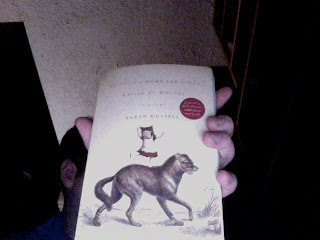This is my first foray into the seedy, gross, and morally aberrant world that James Ellroy presents in his novels, and, despite a few road bumps on the way, I will definitely be taking that journey again someday. Ellroy is an interesting figure in the world of modern writing. He is a much more complex and sophisticated version of the average hard-boiled detective fiction, but he manages, in interviews and such, to be down right bat shit crazy, which I honestly think is an act he puts on for the camera. He writes like a wounded wolf, determined to tell his brutal side of the story before he succumbs to the injuries this world perpetrates on him. But there is a great beauty to his prose, which fires off from the page like a tommy gun. It has rhythmic jazz-like quality to it that fills his stories of pimps, trannies, murderers, rapist and other kinds of degenerate monsters with a kind of angelic quality that elevates his stories to mythic proportions. I wanted to start with American Tabloid because of it being Time Magazine’s best fiction book of 1995, and the premise interested me: three guys, Ward, an underdog lawyer wanting to do right, Kemper, a suave slimy FBI employee, and Pete, a brutal hit man/bodyguard for Howard Hughes, as Ellroy uses them to rewrite history from ’58 to ’63 in his unique way. But I found it easy to get lost in historical data that had me chasing the plot and losing it many times, although it is interesting to see figures like JFK, J Edgar Hoover, and especially Howard Hughes in such a negative like. And that is where this book shines and made me want to finish it. The people Ellroy walks out onto his stage are so interesting, finely drawn, and sometimes too morally repellant not to want to follow them through five hundred pages and two longer books. Despite the hefty focus on historical data, American Tabloid is worth the time spent in Ellroy’s underworld of American history.
Rating: 4/5



